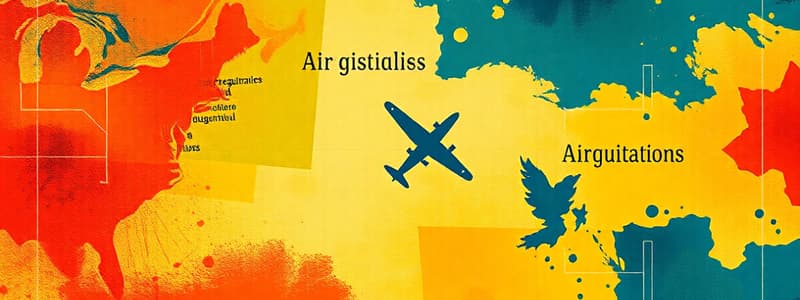Podcast
Questions and Answers
What does Part 91 of the regulations primarily govern?
What does Part 91 of the regulations primarily govern?
- Transportation of dangerous goods
- General operating and flight rules (correct)
- Pilot training requirements
- Use of unmanned aircraft systems
Which section mandates preflight checks and passenger briefings?
Which section mandates preflight checks and passenger briefings?
- Flight Rules (correct)
- Operational Guidelines
- Maintenance Regulations
- Pilot Responsibilities
What is required for operating in special VFR conditions according to the regulations?
What is required for operating in special VFR conditions according to the regulations?
- Specific aircraft certifications
- Special operating restrictions
- Basic VFR weather minimums (correct)
- Basic emergency protocols
What does the maintenance protocols section outline?
What does the maintenance protocols section outline?
What aspect does the noise limits section of the regulations focus on?
What aspect does the noise limits section of the regulations focus on?
Which category does the section on special flight operations not include?
Which category does the section on special flight operations not include?
What is included under the appendices mentioned in Part 91?
What is included under the appendices mentioned in Part 91?
What is the primary focus of GACAR Part 109?
What is the primary focus of GACAR Part 109?
Who is responsible for accurately describing the contents of packages containing dangerous goods?
Who is responsible for accurately describing the contents of packages containing dangerous goods?
What must packaging for dangerous goods meet according to regulations?
What must packaging for dangerous goods meet according to regulations?
What is required for individuals preparing dangerous goods for transport?
What is required for individuals preparing dangerous goods for transport?
Which of the following is NOT a responsibility of aircraft operators regarding dangerous goods?
Which of the following is NOT a responsibility of aircraft operators regarding dangerous goods?
What type of manuals must contain procedures for preparing dangerous goods for transport?
What type of manuals must contain procedures for preparing dangerous goods for transport?
How long must records of dangerous goods training be maintained?
How long must records of dangerous goods training be maintained?
What is required for transporting dangerous goods by air?
What is required for transporting dangerous goods by air?
What kind of training must personnel involved in handling dangerous goods receive?
What kind of training must personnel involved in handling dangerous goods receive?
Flashcards are hidden until you start studying
Study Notes
Regulations Overview
- GACAR Sections cover airspace regulations, search & rescue, designated airspace routes, and instrument flight procedures.
- General Operating Rules include guidelines for civil aviation operations in Saudi Arabia.
Part 91 - General Operating and Flight Rules
- Applicability: Outlines scope, exceptions, and entities subject to regulations.
- Pilot Responsibilities: Emphasizes the authority of the Pilot in Command (PIC) and requirements for aircraft airworthiness.
- Preflight Actions: mandates safety briefings and comprehensive preflight checks for all flights.
- Safety Protocols: Enforces the use of restraints such as seatbelts and child safety devices.
- Weather Minimums: Sets basic Visual Flight Rules (VFR) weather criteria and special VFR operation requirements.
- Certification Requirements: Lists necessary certifications and standards for civil aircraft.
- Equipment Standards: Specifies required instruments across various aircraft categories.
- Operational Guidelines: Includes regulations for low visibility, aerobatic maneuvers, and air ambulance missions.
- Maintenance Protocols: Outlines practices for aircraft maintenance, inspections, and documentation.
- Noise Limits: Establishes maximum allowable noise emissions to safeguard the environment.
- Special Operating Restrictions: Details specific locations with operational limitations.
- Medical Kit Specifications: Provides guidelines for essential contents in onboard medical kits.
GACAR Part 109 - Transportation of Dangerous Goods by Air
- General Provisions: Regulations apply to aircraft operators, shippers, and passengers and follow the Technical Instructions for Safe Transport.
- Packing and Shipping: Shippers must ensure accurate labeling and compliance with safety standards to avoid leaks.
- Certification and Authorization: Requires a Dangerous Goods Preparer Certificate (DGPC) for those preparing goods and Dangerous Goods Transport Authorization (DGTA) for operators.
- Operator Responsibilities: Operators must inspect packages for damage and ensure proper segregation of dangerous goods.
- Provision of Information: Ensures crew and passengers are informed about handling dangerous goods and emergency procedures.
- Dangerous Goods Training: Mandates training programs for personnel handling dangerous goods, with qualified instructors.
- Dangerous Goods Manuals: Requires specific manuals detailing preparation and transportation procedures.
- Reports and Records: Operators must report incidents to the General Authority of Civil Aviation (GACA) and maintain training records for at least 36 months.
Studying That Suits You
Use AI to generate personalized quizzes and flashcards to suit your learning preferences.




